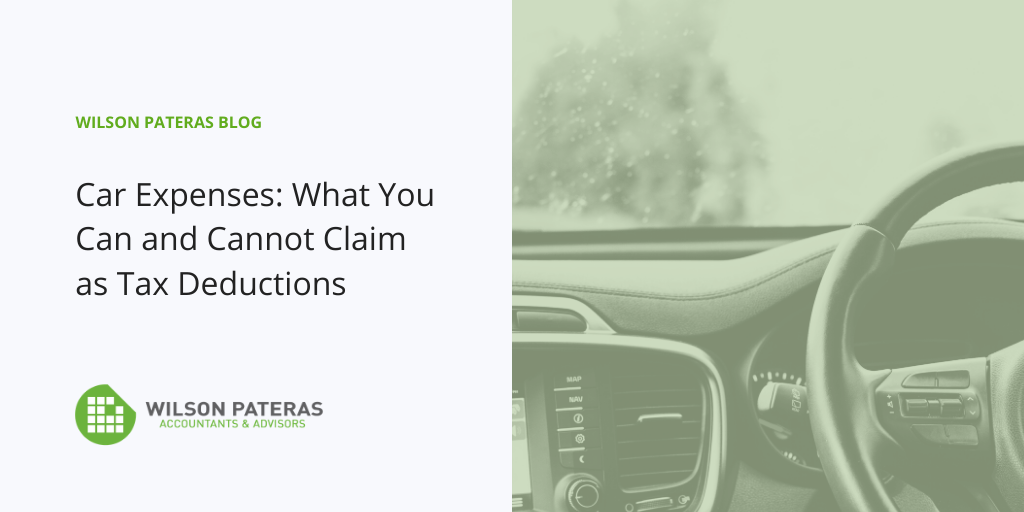
It is tax time again and it is important to understand that your car expenses can be tax deductible if you meet the eligibility requirements. In this article, we will answer common questions about motor vehicle tax deductions, including:
- what are the eligibility requirements?
- can you claim parking fees as a tax deduction?
- can you claim a tax deduction for driving to and from work?
- how do you calculate your tax-deductible car expenses?
- what records do you need to keep to claim car tax deductions?
Eligibility requirements for claiming car expenses on your tax return
If you use your own car for work purposes (including a car that you are leasing or paying off), you can claim running cost expenses such as:
- petrol and oil,
- registration,
- servicing and repair costs,
- car insurance,
- the cost of any damage you cause to another vehicle in an accident,
- interest on your car loan (if you have one),
- lease payments (if you are leasing your vehicle), and
- depreciation (its decline in value over time).
In addition, if you run a business, you can claim the above costs for any vehicles you provide to your staff as part of their employment.
You cannot claim:
- the purchase price of your car unless you are running a business and you claim a deduction under the instant asset write-off scheme,
- any car expenses that you have salary sacrificed,
- any car expenses that have been reimbursed to you by your employer, and
- the cost of any private (i.e. non work-related) travel that you may do in your vehicle.
If you use your car for both private and work purposes, you can only claim the work portion of your car expenses as a tax deduction. For example, 50%.
It is important to understand that you must be able to justify how you have calculated the percentage of work use that you claim in case you are ever audited by the Australian Taxation Office (ATO). You can do this by recording your kilometres travelled and the associated work purposes in a logbook.
Can you claim parking fees as a tax deduction?
Yes, work-related parking fees are tax deductible. However, you don’t claim them as a car expense on your tax return. You claim them as a work-related travel expense instead.
You also claim work-related bridge and road tolls as a travel expense rather than a car expense on your tax return.
Can you claim a tax deduction for driving to and from work?
No, this is regarded as a private expense except in special circumstances such as:
- if you run a home-based business and you travel for work-related purposes,
- if you are travelling between two workplaces, or
- if you are required to carry tools or equipment that cannot be stored at your workplace. For example, if you are a tradesman.
How do you calculate your tax-deductible car expenses?
There are two methods you can use:
1) the ‘cents per kilometre’ method, or
2) the logbook method.
Cents per kilometre method
The cents per kilometre method applies a flat deduction rate per kilometre up to a maximum of 5,000 kilometres. The rate for the 2019/20 financial year is 68 cents.
Example: If you have travelled for 4,000 kilometres in the past financial year for work purposes, you would be eligible for a tax-deductible car expense of $2,720 (i.e. 4,000 x 68 cents).
You will need to be able to demonstrate how you have calculated the kilometres you claim if you are ever audited by the ATO (for example, by keeping a logbook that records your work use of your vehicle).
The cents per kilometre rate will rise to 72 cents for the 2020/21 financial year.
Logbook method
The logbook method is the one you should use if you are going to claim car expenses for more than 5,000 kilometres of business travel in any financial year. The logbook method requires you to:
- keep records of your travel for a continuous period of least 12 weeks, noting the odometer (speedo) readings, as well as the purpose of your travel (i.e. work-related or private).
- use this information to determine your percentage of work-related car use. You can use this information to determine an appropriate percentage of your car expenses to deduct.
Example: If you travelled for 20,000 kilometres in your vehicle in the last financial year and your log book reveals that 60% of your travel was for work-related purposes, you would be eligible to deduct 60% of your eligible car expenses. If your total car expenses were $5,000, you would be able to claim $3,000 as a tax-deductible car expense (i.e. 60% of $5,000).
What records do you need to keep to claim car tax deductions?
You need to keep:
- records of your actual motor vehicle expenses, and
- a logbook that itemises your work-related trips if you use your vehicle for both private and work purposes.
You need to keep these records for at least five years after you submit your tax return in case you are ever audited by the ATO.
How we can help
As you can see, there are many factors to consider when making car expense claims on your tax return. Our experienced team of tax advisors at Wilson Pateras in Richmond can answer any question you may have on the tax deductibility of your car expenses or any other tax questions you may have. They can also help you to maximise your eligible tax deductions, so you pay less tax.
It is important to understand that tax minimisation through claiming all of your eligible deductions is a legal and sensible financial strategy. Tax avoidance on the other hand is not and carries heavy penalties from the ATO. We can help to ensure your legal compliance with the Australian tax law.
Contact us today for a complimentary, obligation-free consultation to find out how we can help you with your tax!




